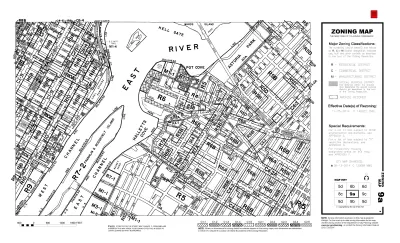An editorial in the New York Times argues that exclusionary zoning reinforces segregation and must be curbed.

Richard D. Kahlenberg sees segregation written into the zoning laws of American cities and towns. Even though racial segregation laws have been struck down by the Supreme Court, exclusionary zoning endures, and that zoning, Kahlenberg argues, is fueling segregation.
"The Supreme Court’s comparative willingness to tolerate explicit economic discrimination is mirrored in American public policy," Kahlenberg argues. These laws and policies have ensured that, while racial segregation has decreased, class segregation has increased. "Exclusionary zoning frustrates the Fair Housing Act’s aim by erecting barriers that exclude millions of low-income African-Americans and Latinos from wealthier white communities," Kahlenberg writes.
Kahlenberg sees a solution in a curb on the extent of zoning, either with an outright ban or a punitive action. "If we can’t achieve a ban, we should assess a penalty on municipalities that engage in discriminatory zoning, either by withholding infrastructure funds or limiting the tax deduction that homeowners in those towns can take for mortgage interest," he writes.
FULL STORY: The Walls We Won’t Tear Down

Montreal Mall to Become 6,000 Housing Units
Place Versailles will be transformed into a mixed-use complex over the next 25 years.

Planetizen Federal Action Tracker
A weekly monitor of how Trump’s orders and actions are impacting planners and planning in America.

California High-Speed Rail's Plan to Right Itself
The railroad's new CEO thinks he can get the project back on track. The stars will need to align this summer.

Tenant Advocates: Rent Gouging Rampant After LA Wildfires
The Rent Brigade says it's found evidence of thousands of likely instances of rent gouging. In some cases, the landlords accused of exploiting the fires had made campaign donations to those responsible for enforcement.

Seattle’s Upzoning Plan is Ambitious, Light on Details
The city passed a ‘bare-bones’ framework to comply with state housing laws that paves the way for more middle housing, but the debate over how and where to build is just getting started.

DOJ Seeks to End USDOT Affirmative Action Program
The Disadvantaged Business Enterprise Program encouraged contracting with minority- and women-owned businesses in the transportation sector, where these groups are vastly underrepresented.
Urban Design for Planners 1: Software Tools
This six-course series explores essential urban design concepts using open source software and equips planners with the tools they need to participate fully in the urban design process.
Planning for Universal Design
Learn the tools for implementing Universal Design in planning regulations.
City of Camden Redevelopment Agency
City of Astoria
Transportation Research & Education Center (TREC) at Portland State University
City of Camden Redevelopment Agency
Municipality of Princeton (NJ)
Regional Transportation Commission of Southern Nevada





























